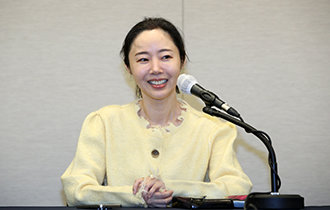Expert Breaks Down Bushs Presidency
Expert Breaks Down Bushs Presidency
Posted January. 15, 2007 03:09,
At the G-8 Summit in the Russian city of St. Petersburg last July, U.S. President George W. Bush and British Prime Minister Tony Blair had the following conversation without knowing that they were overheard through the microphone left on.
Yo, Blair. How are you doing? Im just What about Kofi? That seems odd. You see, the thing is what they need to do is get Syria, to get Hezbollah to stop doing this shit and its over.
Their words reminded of teenage boys who chat with each other. However, it is a rarity that Western political leaders reveal their real words before the public. They show thoroughly prepared vocabularies and facial expressions in front of people. President Bush appears on TV almost every day and carefully uses concise and refined vocabularies. In a way, this might be far from the truth. Your reporter met with Georgetown University Professor Stephen J. Wayne, an expert on American presidents, over the weekend to share his thoughts on the words and gestures of a president. Wayne said, A shouting president can attract some attention, but that does no good to the country.
Q: Watching President Bush making a speech, he looks totally different from Mr. Bush uttering words like asshole as written in the book about the inner workings of the White House. Isnt it more honest to reveal his real self than just read a prepared material?
Speaking candidly can be a great virtue. However, for a president, that is not enough. The words that a president thinks true and honest are OK for him or her, but those words might not be all right for a nation.
When a president speaks in an official setting, he or she speaks for the administration and the nation, not for himself as an individual. It is good to use candid words as a presidential candidate. But once taking office, a president is not an individual but a symbol of a country. A presidents remarks should be released refined by many people.
Q: How are presidential speeches prepared in the U.S.?
There are few improvised remarks. Lets take the North Korean nuclear issue, for instance. A National Security Council official in the State Department writes a draft speech and circulates the copy among related departments, such as defense and CIA. If some disagreement on expressions emerges, there is an adjustment. If the officials fail to adjust, the president makes the final decision. A presidential speechwriter makes the final draft and sends it back to related departments for a review. The draft is read not only by aides but also by some representatives for response. That is to filter the speech before the president demonstrates his conviction in front of reporters and cameras.
Personal truth has its value, but official words should be released after careful consideration in light of national interests.
The professor explained, Remarks about diplomatic or military issues sometimes obscure the real intention or contain disinformation, adding, That is to make it hard for the opposing end to fathom the underlying intention.
He pointed out, There are examples that President Bush took an emotional and straightforward decision because he made little effort to reflect various opinions and deliberate expected responses. The Iraq war is a case in point.
A president should think of two things when he or she speaks officially. He should be a president of people and a president who leads people at the same time. People want their president to understand their thoughts and emotions. Politicians use vocabularies of ordinary people to show that they do.
But, at the same time, people expect a presidents words to be more considerate, logical and to the point. Even if a president is an ordinary person himself, he should contain dignity, discretion and respect for his position in his remarks as a president. There should be a clear distinction among himself as a president, as an individual and as a presidential candidate.
Q: The U.S. media seem to be very critical of President Bush these days. Whats the presidents response?
In a democratic society, the media helps strike a balance by providing the public a different perspective (from what the president explains). Leaders who believe their side of truth is the only truth cannot stand criticism from the media. Of course, there are lots of problems with the U.S. media.
He emphasized, All politicians tend to think that they get more than their fair share of criticism.
Q: Isnt it useful to use controversial expressions to induce peoples attention?
Leaders who need public attention tend to shout because that makes him at the center of the battle line. But that does no good to the nation. First, that gradually undermines peoples trust in the government and public office. People might understand why their leader do that, but they will not respect the leader (with the exception of core supporters).
Q: Which is better between a talkative leader and an overly quiet leader?
To be quiet is not good. A leader can have a spokesman or aide speak for him, but the leader should speak himself or herself in many cases. A president is an educator. He has an official responsibility to educate and persuade people.
However, talking too much is also a drawback. That makes him look imprudent and runs the risk of making careless remarks that can put him in a difficult position. A presidential speech should be a special event. If he speaks too often, people will pay less attention to the speech, and a presidential speech will not enjoy the attention and treatment that it deserves.
Q: Lets say you are elected as a president with 51 percent support from voters. Which is more important, to achieve what the majority 51 percent of the people want or to respect and embrace what the remaining 49 percent want?
Three things should be considered. First, unless it was a forced vote, 51 percent or 49 percent only represent those who cast their ballots, not all of the people. There have been few presidents in the U.S. who were elected with more than one-third support from all eligible voters.
Second, you need to consider the political system. When the ruling party dominates both the administration and Congress, a more partisan approach makes sense. However, when the opposition party dominates Congress, as now the Democrats do, there is no option for the president. To be successful, he should take a bipartisan approach. Third, you should consider in what situation he was elected.
Q: Some predict that President Bush will be a lame duck president soon. What attitude should a lame duck president have?
President Bush forcefully pushes forward with a new Iraq policy, which neither Congress nor public opinion supports. It is never wise for a lame duck president to take initiative on an issue that lacks backing from Congress. The stronger he pushes it, the less popular and less powerful he becomes. There is a time when the country should move fast, and there is a time when it needs a rest. A strong president during his term tends to conclude pending issues with people, rather than attempting to take initiative of a massive policy.
sechepa@donga.com







